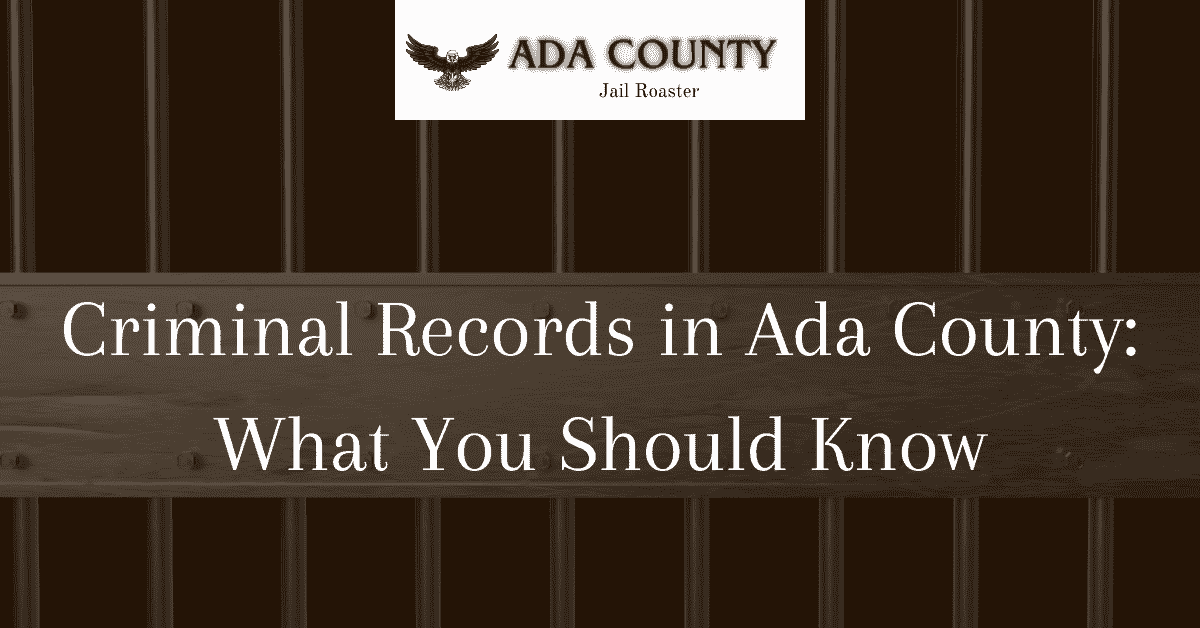Criminal Records in Ada County: What You Should Know
Understanding the significance of criminal records can be crucial for individuals residing in Ada County. Whether you are a longtime resident or new to the area, having knowledge about the implications of criminal records is essential. By being informed about the ins and outs of this topic, you can navigate various situations with confidence and clarity.
From job applications to housing opportunities, criminal records can impact various aspects of life. Knowing what to expect and how to address any issues that may arise can make a significant difference. In Ada County, being aware of the nuances surrounding criminal records is a proactive step towards ensuring your rights and responsibilities are upheld.
The Impact of Criminal Records on Employment Opportunities
Understanding the significance of criminal records goes beyond personal knowledge; it directly affects various aspects of one’s life, including employment opportunities. In Ada County, just like in many other regions, individuals with criminal records may face challenges when applying for jobs. Employers often conduct background checks as part of their hiring process, and a criminal record can be a red flag that raises concerns about an applicant’s trustworthiness and reliability.
Having a criminal record does not automatically disqualify someone from getting a job, but it can make the job search process more challenging. Certain industries, such as healthcare, education, and law enforcement, have strict regulations regarding criminal backgrounds, making it even harder for individuals with records to secure employment in these fields. It is crucial for individuals in Ada County to be aware of how their criminal records can impact their job prospects and to know their rights when it comes to disclosing this information to potential employers.
Navigating Housing Opportunities with a Criminal Record
Another area where the implications of criminal records come into play is in the housing market. Landlords and property management companies often conduct background checks on potential tenants to assess their risk level. A criminal record can be a significant barrier to securing housing, as landlords may view it as a liability that could pose a threat to other tenants or the property itself.
Individuals with criminal records may find it challenging to rent an apartment or house, especially in competitive rental markets like Ada County. It is essential for individuals to understand their rights and responsibilities when it comes to disclosing their criminal history to landlords and to be prepared to address any concerns that may arise during the application process. Being proactive and transparent about one’s criminal record can help mitigate potential issues and increase the chances of securing housing.
Legal Rights and Responsibilities Regarding Criminal Records
Knowing one’s legal rights and responsibilities concerning criminal records is crucial for individuals in Ada County. The laws surrounding criminal records can vary from state to state, so it is essential to be informed about the specific regulations that apply in Idaho. Understanding what information is included in a criminal record, how long it stays on file, and who has access to it can help individuals navigate various situations with confidence.
Individuals with criminal records have certain rights, such as the right to challenge inaccurate or outdated information on their record and the right to know who has viewed their record. It is also important to understand the implications of sealing or expunging a criminal record and how it can affect one’s ability to secure employment or housing in the future. By knowing their legal rights and responsibilities, individuals can advocate for themselves and protect their interests when dealing with their criminal records.
FAQs
What information is included in a criminal record?
A criminal record typically includes details of any arrests, charges, convictions, and sentencing information related to criminal offenses. It may also include information about probation, parole, and any fines or fees associated with the offense. This information is maintained by law enforcement agencies and can be accessed by authorized individuals or organizations.
How get Ada County criminal record?
In Ada County, you can request a copy of your criminal record from the Idaho State Police. They provide a Criminal History Unit where you can submit a request for your own criminal record. You will need to provide personal information and pay a fee for the processing of your request. It is important to review your criminal record periodically to ensure its accuracy and address any discrepancies that may arise.
Can I have my criminal record expunged in Ada County?
Expungement of a criminal record in Ada County is possible under certain circumstances. If you have completed your sentence, met all requirements, and maintained a clean record for a specified period, you may be eligible to petition for expungement. The process involves filing a petition with the court, attending a hearing, and providing evidence of rehabilitation. Expungement can provide a fresh start by sealing your criminal record from public view.
How long are Ada Co. criminal records kept?
In Ada County, criminal records can vary in terms of how long they stay on file. Misdemeanor convictions may stay on record for several years, while felony convictions can remain on file indefinitely. It is important to be aware of the statutes of limitations and regulations regarding the retention of criminal records in Ada County. Understanding the timeline for record retention can help you make informed decisions regarding your legal rights and obligations.
Ada job prospects: How do records affect?
Criminal records can have a significant impact on employment opportunities in Ada County. Many employers conduct background checks as part of the hiring process, and a criminal record can influence their decision. However, Ada County has laws in place to protect individuals with criminal records from discrimination in employment. Understanding your rights and responsibilities regarding criminal records can help you navigate the job market effectively and advocate for fair treatment.







